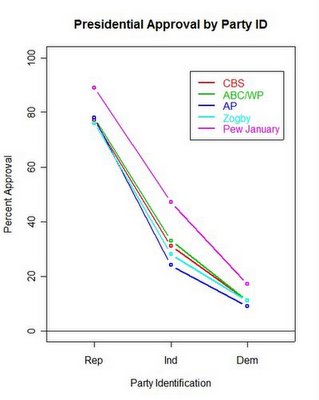
Presidential approval by party identification in four post-indictment polls compared to results from January 2005.
Barry Burden posted a comment here asking if approval has begun to drop among Republicans. That seemed a good enough issue to deserve a post of its own. He points out that Republican support has been running over 80% which has provided a strong base that would support President Bush despite declines among independents and Democrats.
The answer is that support has declined among Republicans as well as Democrats.
In these latest four polls, the approval rate among Republicans is 77, 78, 78 and 76%. In a January 2005 Pew poll the Republican support level was 89% (and an AP poll from December 2004 put the rate at 91%.) At the same time the Democratic support rate was 17% among Democrats while it is now 11, 11, 9, and 11 in these late polls. So there has been an approximately 12% decline among Republicans and a 6% or so decline among Democrats. Among Independents, there is more variation in support: 31, 33, 24 and 28. This compares to 47% in the January Pew poll, a fall of some 17%. Thus the rate of decline has been strongest among Independents, then Republicans and least among Democrats (who had less room to drop.)
The Pew Center for the People and the Press has a very nice graph of this in this report from early October. Their graph is nice because the comparison is all between their own polls, avoiding the house effects that are present in my comparison here. The salient paragraph in their comparison is
The president continues to draw strong support from Republicans, 81% of whom approve of the job he is doing. But that number reflects an eight-point decline since January, with most of that drop occurring in late summer. Among independents, a plurality of 47% approved of Bush's performance in January; now just 34% do so. Approval among Democrats is now in the single digits (9%), down from 17% in January.
There has been some discussion concerning “how low can approval go”. MysteryPollster has a nice discussion here and here. Some have argued that there is a floor for President Bush due to his exceptionally strong support among Republicans. But that only holds if his base remains constant in their strong support. These data suggest that base has been eroding at an alarming rate. While the level is still high, it is not as stable as other commentary would suggest.
A related concern for the President is the percentage of Republicans in the public. There is evidence that this has been declining modestly over the course of the year. See this piece by Alan Abramowitz at the Cook Political Report. See figure 3 on page 4.
The declining support among Republicans and the modest decline in Republican identifiers suggests that while it is way too early to panic, there is a significant possibility for further erosion in support for the President. Those who think there is a hard floor of support may be overestimating partisan loyalties.
